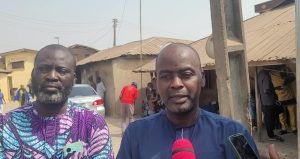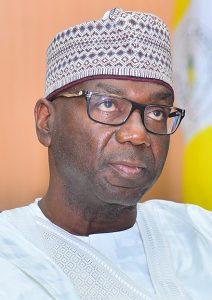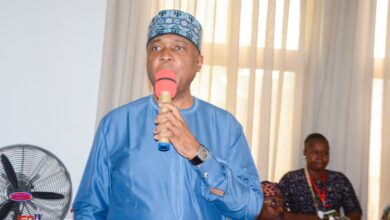Why Hafsoh May Not Get Deserved Justice if Abdulrahman is Convicted * Sources Say Only Kwara Governor Can Approve His Execution

By Omowumi Omotosho
Despite mounting public outcry for justice following the brutal murder of Kwara State College of Education graduate, Hafsoh Lawal, fresh concerns have emerged over whether the prime suspect, Abdulrahman Bello, will face the full weight of the law—even if convicted.
If convicted, Abdulrahman faces death penalty by hanging, as his alleged crime falls under capital punishment in Nigeria’s Criminal Penal Code. Given the gruesome nature of Hafsoh Lawal’s murder, various religious group, traditional councils, civil society groups, legal practitioners, and members of the public have been calling for swift judgement and execution to serve as a deterrent to others.
National Pilot Newspaper findings into Abdulrahman’s lifestyle at Oke-Kura Custodial Centre, Ilorin before he was transferred to the custody of the Department of State Services (DSS) for further investigation last week, revealed that upon his arrival at the Custodial centre on February 18, 2025 after a magistrate court ruling by Chief Magistrate S.B Mohammed ordered his remand and four others, Abdulrahman after getting his prison identity, was kept in a single cell away from other inmates.

Abdulrahman (centre) and other murder suspects at their last appearance in court

Oke-Kura Custodial Centre
At the Custodial centre, sources told National Pilot Newspaper that Abdulrahman was always quiet and does his Islamic prayer regularly. Also, throughout his 24 days stay at Oke-Kura Custodial Centre, Abdulrahman was not visited by anyone and was not given any special treatment. He ate same meals as other inmates and engage in daily routine of the custodial centre which begins with a wake-up call and a headcount, followed by a brief period for personal hygiene and meal serving.
“He is always quiet, keeps to himself, does his prayer and has no record of receiving visitors. He adhered strictly to Custodial Centre daily routine and is fed the same meals as other inmates without any special privileges,” a source told National Pilot Newspaper.

However, National Pilot further investigation suggests that demand for justice over Abdulrahman’s alleged murder of Hafsoh by the aggrieved populace, may not be met. This is due to legal and administrative hurdles surrounding capital punishment in Nigeria, particularly in Kwara State, where no execution has been carried out for about 30 years now.
Since the return of civilian rule in 1999, no governor of Kwara State has signed a death warrant for any condemned prisoner.
The four governors who have led the state during this period—Mohammed Lawal (1999-2003), Bukola Saraki (2003-2011), Abdulfatah Ahmed (2011-2019), and the incumbent Abdulrahman Abdulrazaq (2019-present)— didn’t sign any executions order, despite the rising number of condemned criminals on death row.


Hafsoh’s father, Ibrahim Lawal on the right
An authoritative source within the Kwara State criminal justice system, who spoke to National Pilot under anonymity, explained that the execution of Abdulrahman, if convicted requires the explicit approval of the Kwara state governor, Mallam Abdulrahman Abdulrazaq who will request for the list of condemned criminals who have exhausted all legal options at the Appeal Court and Supreme Court from the State Controller of Corrections who will then notify the Controller-General of the Nigeria Correctional Service for final approval.

Governor Abdulrahman Abdulrazaq
“The process is not automatic. The governor must formally request a list of inmates on death row from the Controller of Corrections. This list includes those who have exhausted all legal appeals, including at the Court of Appeal and the Supreme Court. The Controller then forwards the list to the Controller-General of the Nigeria Correctional Service, who awaits final directives,” the source explained.
The source further revealed that “in Kwara State, no execution has been carried out in over 30 years, and currently, 73 inmates are on death row in the state.”
The situation reflects a nationwide crisis, with the Acting Controller-General of the Nigeria Correctional Service, Sylvester Nwakuche, recently revealing that 3,688 prisoners are on death row across the country.
Although Nigeria still upholds capital punishment in law, but actual executions have become increasingly rare. A major reason is that state governors are often reluctant to sign execution warrants due to political, religious, and human rights concerns.
For instance, former President Goodluck Jonathan had, during his tenure, urged state governors to either sign execution warrants or commute death sentences to life imprisonment to address the backlog of condemned inmates in the system.
However, most governors have hesitated, partly due to pressure from human rights organizations such as Amnesty International, which continues to advocate for the abolition of the death penalty.
Another critical factor is the absence of executioners. If the Kwara State governor, Mallam Abdulrahman Abdulrazaq decides to sign Abdulrahman’s death warrant when convicted, he may still not be executed due to absence of hangmen in Nigeria Custodial Centres. National Pilot recalls that the Nigeria Correctional Service (NCS) few years back once advertised vacancies for executioners to enforce death penalties nationwide.
Further findings by National Pilot Newspaper at Oke-Kura and Mandala Custodial Centres revealed that for now there is no officer that have been assigned with the role of executioner in Kwara State. This may be a stumbling block in the quest for desirable justice for Hafsoh, if Abdulrahman is convicted.
A senior official at the facility told National Pilot Newspaper that:”Even if the governor signs a death warrant today, the system lacks the personnel to carry it out. There are no trained executioners. This is part of the reason many death row inmates end up spending decades in prison rather than being executed.”
Given these legal and logistical challenges, Abdulrahman Bello may never face execution, even if convicted and may end up like other condemned criminals who are feeding freely on the country’s budget. If history is anything to go by, he could instead spend years or even decades on death row, awaiting a governor’s decision that may never come.
This leaves the family of Hafsoh Lawal and the public with a troubling reality: while the courts may deliver a guilty verdict, the justice that many seek may remain elusive.




